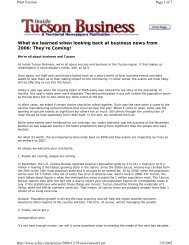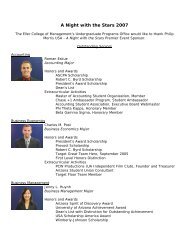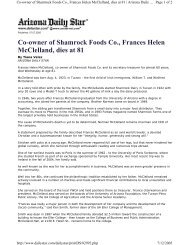PROGRESS MAGAZINE - Eller College of Management - University ...
PROGRESS MAGAZINE - Eller College of Management - University ...
PROGRESS MAGAZINE - Eller College of Management - University ...
Create successful ePaper yourself
Turn your PDF publications into a flip-book with our unique Google optimized e-Paper software.
ELLER PERSPECTIVESThe Sarbanes-Oxley Effect<strong>Eller</strong> associate pr<strong>of</strong>essor <strong>of</strong> accountingDan Bens weighs in on the legislationfive years after it was signed into law.Dan BensIn July 2002, Congress passed theSarbanes-Oxley Act — named for SenatorPaul Sarbanes (D-MD) and RepresentativeMichael G. Oxley (R-OH) — which reformedaccounting and reporting practices in thewake <strong>of</strong> high-pr<strong>of</strong>ile corporate accountingscandals by such firms as Enron, Tyco, andWorldCom.Now, five years later, is there anyevidence that the broad Sarbanes-Oxley(SOX) reforms have had the intendedeffect? “The researcher’s challenge is toseparate effects <strong>of</strong> SOX from the effects <strong>of</strong>people self-regulating after observing allthe arrests and convictions,” explains DanBens. “Measuring the amount <strong>of</strong> fraudbefore and after is not tractable; this isn’ta case where we can add something to aPetri dish and then record the change.”Bens is skeptical <strong>of</strong> studies that indicatethat the stock market improved as a result<strong>of</strong> the legislation. “SOX was enacted duringa stock meltdown,” he says. “The meltdownshook out a lot <strong>of</strong> Internet companiesthat weren’t operating on soundbusiness models, for example, so I don’tthink you can look at stock returns andattribute them to SOX alone.”Right now, he says, the biggest debatecenters around the way SOX affects firms<strong>of</strong> different sizes. “The costs <strong>of</strong> implementationare fixed, so a large company likeMicros<strong>of</strong>t with a lot <strong>of</strong> revenue coming incan spread those costs out,” he says. “Forstart-ups and young publicly traded firms,that’s not the case.” As a result, theSecurities and Exchange Commission haspushed back the small firm compliancedeadline again and again. “For some smallfirms, the cost <strong>of</strong> SOX compliance is keepingthem from going public,” says Bens.“Research shows that some <strong>of</strong> these firmsare staying private, or choosing to gopublic abroad on the London StockExchange, for example.”In a recent paper, "Altering InvestmentDecisions to Manage Financial ReportingOutcomes: Asset-Backed CommercialPaper Conduits and FIN 46," Bens andSteven Monahan <strong>of</strong> INSEAD demonstratedthat in some cases, regulation designed tohelp a market can end up hurting it. “Wediscovered that as a result <strong>of</strong> post-Enronregulation by the Financial AccountingStandards Board, North American bankslost market share to foreign banks in thesecuritization environment,” he says.In terms <strong>of</strong> SOX, Bens points out thatthe number <strong>of</strong> firms listing abroad ratherthan in the U.S. is a trickle, not a deluge.Still, it’s not good news for New York.“The city’s economy is partially tied to theinvestment banking industry,” he explains.“So the effect is no different than a manufacturing-intensiveregion in the U.S.losing blue-collar jobs to other countries.”Overall, Bens says he’s not convincedthat there was a need for the SOX legislation.“Fraud is going to happen,” he says.“People are going to behave badly. It isn’tclear to me that SOX will be that muchmore effective in ferreting out fraudulentbehavior, and it’s human nature for somepeople to refuse to play by the rules.Sometimes those people are going tobe CEOs.”Stock photo10 ELLER <strong>PROGRESS</strong> THE UNIVERSITY OF ARIZONAWWW.ELLER.ARIZONA.EDUFALL / WINTER 2007 11
















